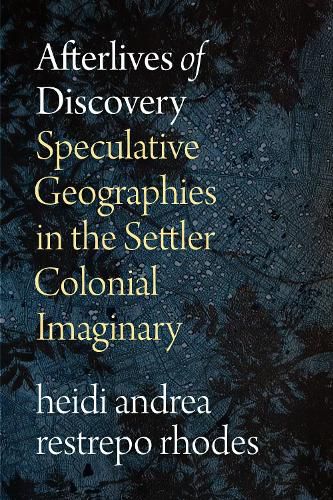Readings Newsletter
Become a Readings Member to make your shopping experience even easier.
Sign in or sign up for free!
You’re not far away from qualifying for FREE standard shipping within Australia
You’ve qualified for FREE standard shipping within Australia
The cart is loading…






In Afterlives of Discovery, heidi andrea restrepo rhodes traces global and national histories as they entangle through the concept and material life of Discovery across Colombia's evolution into a liberal settler colonial state. Rather than seeing Discovery as a singular event or bygone era, rhodes theorizes Discovery as a globally encompassing, racialized formation of domination and geographic speculation that continues to structure settler colonialism. Discovery's logics, they argue, are rooted in colonial and capitalist fantasies projected onto the racialized space and place of the colonized other. rhodes draws on critical theory, human rights research, and Colombian archives to challenge dominant narratives that maintain the Colombian armed conflict began as a Marxist insurgency in 1964. Instead, rhodes shows that the conflict is an extension of Discovery's ongoingness via projects of dispossession, extraction, whitening, and epistemic and political hegemony. Given that Colombia's national past, present, and future are grounded in Discovery, rhodes asks: How is it possible to build futures that escape Discovery's grasp?
$9.00 standard shipping within Australia
FREE standard shipping within Australia for orders over $100.00
Express & International shipping calculated at checkout
In Afterlives of Discovery, heidi andrea restrepo rhodes traces global and national histories as they entangle through the concept and material life of Discovery across Colombia's evolution into a liberal settler colonial state. Rather than seeing Discovery as a singular event or bygone era, rhodes theorizes Discovery as a globally encompassing, racialized formation of domination and geographic speculation that continues to structure settler colonialism. Discovery's logics, they argue, are rooted in colonial and capitalist fantasies projected onto the racialized space and place of the colonized other. rhodes draws on critical theory, human rights research, and Colombian archives to challenge dominant narratives that maintain the Colombian armed conflict began as a Marxist insurgency in 1964. Instead, rhodes shows that the conflict is an extension of Discovery's ongoingness via projects of dispossession, extraction, whitening, and epistemic and political hegemony. Given that Colombia's national past, present, and future are grounded in Discovery, rhodes asks: How is it possible to build futures that escape Discovery's grasp?